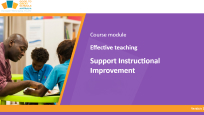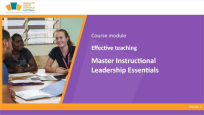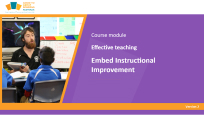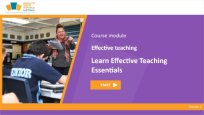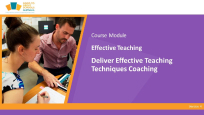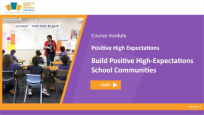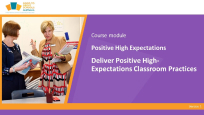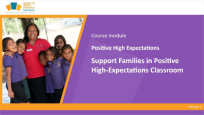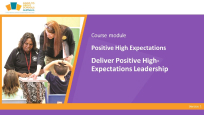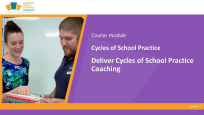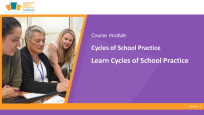Course Modules
A range of specialised evidence-based modules that cover the knowledge, skills and practices of effective teaching. Modules enable participants to learn about effective teaching and confidently apply what they learn in their role.
Share this page:
Modules
Overview
Effective Teaching
Learn Effective Teaching Essentials
Overview
Learn Effective Teaching Essentials is a professional learning module for principals, instruction coaches, teachers and teaching assistants that is aligned to AITSL national standards.
Participants understand how effective teaching leads to increased learning and overall school improvement.
They can implement effective teaching techniques and practices in programs and resources, apply student engagement strategies and build relationships with parents to support students’ school readiness.
Learning Intents
- Understand the basic direct instruction techniques and why they are used (3.1.03).
- Understand the basic explicit instruction techniques and why they are used (3.1.03).
- Demonstrate mastery of basic direct and explicit instruction techniques through weekly program practice sessions and then in classroom delivery (3.1.03).
- Communicate to colleagues and classroom visitors basic direct and explicit instruction techniques and why they are used (3.1.03).
- Understand basic effective teaching techniques and practices (3.2.01).
- Demonstrate ability to teach lessons using direct and explicit instruction teaching techniques (3.2.01).
- Communicate with school leaders, colleagues and parents about the appropriate use of direct and explicit instruction techniques (3.2.01).
- Understand how direct and explicit instruction programs develop strong literacy and numeracy skills for all students (3.2.05).
- Demonstrate direct and explicit instruction techniques to build strong literacy and numeracy for all students (3.2.05).
- Communicate to parents how direct and explicit instruction programs develop literacy and numeracy and the importance of those skills (3.2.05).
- Understand how effective teaching is targeted to students to meet the physical, social, and intellectual development and characteristics of students (3.3.01).
- Understand principles of effective teaching and how it is targeted to students to meet the physical, social, and intellectual development and characteristics of students (3.3.01).
- Communicate to leaders and colleagues information about effective teaching practices and how it is targeted to individual student needs (3.3.01).
- Understand through basic research how students learn and how effective teaching responds to this (3.3.02).
- Demonstrate how research on students learning is incorporated into effective teaching techniques and practices (3.3.02).
- Communicate to school leaders and colleagues how basic research on effective teaching informs teaching practice (3.3.02).
- Covered by 3.3.01 (Incorporate awareness of the differences between students in terms of diverse linguistic, cultural, religious and socioeconomic backgrounds and how effective teaching practices can be applied across student diversity and be effective for all students) (3.3.03).
- Covered by 3.3.01 (Incorporate understanding of the impact of culture, cultural identity and linguistic background on the education of Aboriginal and Torres Strait Islander students) (3.3.04).
- Covered by 3.3.01 (Incorporate differentiated teaching that meets the needs of students across the full range of abilities) (3.3.05).
Prerequisite
- None
Duration
- 10 lessons
Assessment
Assessment has one stage:
- Test: Knowledge and skills taught in the lessons.
Certification
Participants are eligible for certification based on attendance and completion of assessment requirements for each module.
- Certificate of Completion: Complete online training and knowledge and skills tests.
Deliver Effective Teaching Techniques Coaching
Overview
Deliver Effective Teaching Techniques Coaching is a professional learning module for instruction coaches. Participants understand the critical role of coaching to build a school that delivers effective teaching. They can conduct observations and use the data in communicating to teachers and teaching assistants about their practice. They learn how to plan and deliver coaching sessions to support the school team in delivering effective teaching techniques so their teaching is more effective and student results lift across the school.
Learning Intents
- Understand how effective teaching affects instructional improvement (2.1.01).
- Apply key practices that support effective teaching and positive behaviour interventions and strategies (2.1.01).
- Communicate a vision of instructional and behavioural improvement centred on effective teaching (2.1.01).
- Understand what constitutes effective teaching and positive behaviour interventions and supports (2.1.02).
- Apply cycles of practice that support effective teaching implementation (2.1.02).
- Communicate to leaders and teaching team what constitutes effective teaching and cycles of practice that support implementation efforts (2.1.02).
- Review observation and student mastery data to determine need for modelling, coaching and feedback (2.2.06).
- Evaluate need for practice based on observation data and communicate to teachers. (2.3.05).
- Review observation and student mastery data to determine need for reflective practices, structured feedback and peer review (2.3.06).
- Understand how to implement practices that promote a culture of professional learning (2.1.03).
- Communicate importance of professional learning through practices that recognise efforts of leaders and teaching team to improve (2.1.03).
- Plan training and coaching sessions to ensure the entire school team is supported to deliver effective teaching (2.2.05).
- Plan effective practices for supporting fidelity of implementation of effective teaching (2.2.06).
- Implement cycles of practice to support fidelity of implementation, including classroom observations, demonstrations, modelling, coaching and feedback on effective teaching (2.2.06).
- Communicate recommendations of external experts to school team to build knowledge, skills and practice (2.3.01).
- Understand how professional peer networks can support shared practice and use of resources (2.3.03).
- Apply principles of peer collegiality through contributing to professional peer networks (2.3.03).
- Communicate with other schools and education networks via professional peer networks (2.3.03).
- Plan a schedule for program practice sessions (2.3.05).
- Implement an effective agenda for practice sessions (2.3.05).
- Review practice session attendance and follow up to increase participation (2.3.05).
- Plan opportunities for reflective practices, structured feedback, peer review and teaching standards (2.3.06).
- Plan professional conversations to clarify how school vision and values link to operational tasks. (2.2.07).
- Understand gaps between personal knowledge, skills and practice and requirements of own role (2.3.01).
- Apply recommendations of external experts to prioritise learning gaps and increase needed skills (2.3.01).
- Implement cycles of practice that lead to personal improvement of teaching team (2.3.06).
- Evaluate personal improvement of teaching team based on growth in teaching standards (2.3.06).
- Evaluate improvement efforts based on student mastery data (2.2.06).
Prerequisite
- Learn Effective Teaching Essentials
- Build Positive High-Expectation School Communities
Duration
- 12 lessons
Assessment
Assessment has three stages:
- Test: Knowledge and skills taught in the lessons.
- Appraisal: Practical application in practising knowledge and skills learned in the lessons.
- Mastery evaluation: Delivery with students of the knowledge and skills learned in the lessons.
Certification
Participants are eligible for certification based on attendance and completion of assessment requirements for each module.
- Certificate of Attendance: Complete online training and knowledge and skills tests.
- Certificate of Participation: Pass knowledge and skills video appraisal.
- Certificate of Achievement: Pass knowledge and skills video mastery evaluation.
Embed Instructional Improvement
Overview
Embed Instructional Improvement is a professional learning module for teachers that is aligned to AITSL national standards. Participants understand how to strengthen their practice to achieve instructional improvement in their classroom. They can embed cycles of practice in their classroom, use student progress data to improve instruction and build collegiality with peers and parents to improve teaching and learning.
Learning Intents
- Understand how to use student assessment data from informal in-program assessments and related independent progress monitoring (3.6.04).
- Apply knowledge gained from student assessment data to analyse and evaluate student
- Understanding of subject/content (3.6.04).
- Demonstrate the correct use of curricular interventions (within the DI curricula) and non-curricular interventions (e.g., increasing instructional time) to modify teaching practise (3.6.04).
- Communicate student assessment results and actions taken to school leaders (3.6.04).
- Understand the importance of keeping accurate and reliable records of student achievement (3.6.05).
- Apply a range of strategies for reporting student progress to students and colleagues (3.6.05).
- Demonstrate ability to communicate student progress clearly to students and colleagues (3.6.05).
- Communicate student progress in direct and explicit instruction programs using a class data wall (3.6.05).
- Plan a classroom data wall to communicate student progress to students (3.6.07).
- Implement timely, effective and appropriate feedback to students about achievement (3.6.07).
- Review student achievement relative to their learning goals prior to each lesson and with respect to independent work related to the lesson (3.6.07).
- Evaluate student performance and provide feedback with a motivation system for students (3.6.07).
- Plan interventions (within the curricula) and non-curricular interventions (e.g., increasing instructional time) to modify teaching practise based on student assessment data from informal in-program assessments and related independent progress monitoring (3.6.09).
- Implement systems for evaluating learning and teaching using student assessment data (3.6.09).
- Review student assessment data with colleagues in school professional conversations.
- Evaluate learning and teaching in light of student assessment data and make goals to increase student learning (3.6.09).
- Plan objective assessment to support consistent and comparable judgements of student learning (3.6.08).
- Implement objective assessment as directed by school leaders (3.6.08).
- Review student assessment in light of direct and explicit instruction objectives to determine mastery levels (3.6.08).
- Evaluate student assessment (in-program and out-of-program) and use data to make goals for student learning (3.6.08).
- Understand the use of objective assessment (out-of-program assessments) and its application to support consistent and comparable judgements of student learning (3.6.03).
- Demonstrate ability to interpret assessment as directed by school leaders using assessment results to determine student mastery (3.6.03).
- Communicate assessment results to school leaders, colleagues and parents (3.6.03).
- Understand how the instructional program scope and sequence charts are used to set learning goals (3.1.01).
- Demonstrate program knowledge to set learning goals for direct instruction groups and use scaffolding through error correction and remedies and re-testing to ensure learning goals are met (3.1.01).
- Communicate learning goals to school leaders, colleagues and parents (3.1.01).
- Understand a school’s effective teaching implementation and improvement approach for academics and behaviour (3.1.06).
- Understand how the school is continuously improving and what approaches are getting the greatest improvement (3.1.06).
- Demonstrate school-wide improvement actions in academics and behaviour into classroom approach (3.1.06).
- Communicate school-wide improvement actions in academics and behaviour into classroom approach (3.1.06).
- Understand and respect local Aboriginal and Torres Strait Islander histories, cultures, and languages (3.2.04).
- Demonstrate delivery of strategies in the classroom that incorporate local Aboriginal and Torres Strait Islander histories, cultures and languages (3.2.04).
- Communicate with school leaders and colleagues audience-appropriate information that positively adds to an awareness of local Aboriginal and Torres Strait Islander histories, cultures and languages (3.2.04).
- Understand how a range of technologies help deliver and monitor effective techniques and practices and how to use and participate in use (3.2.06).
- Demonstrate basic mastery of a suite of technology to support classroom techniques and practices in academics and behaviour (3.2.06).
- Communicate with school leaders and colleagues, audience-appropriate information about how to use the technology to support classroom techniques and practices in academics and behaviour (3.2.06).
- Understand principles of Effective Teaching and how it is targeted to meet the physical, social and intellectual development and characteristics of students. (Incorporate understanding of how to assess student disabilities, their needs and capabilities and how to ensure students with disabilities are provided effective teaching and can fully participate in instruction) (3.3.06).
- Communicate to leaders and colleagues information about effective teaching practices and how it is targeted to individual student needs. (Incorporate understanding of how to assess student disabilities, their needs and capabilities and how to ensure students with disabilities are provided effective teaching and can fully participate in instruction) (3.3.06).
- Understand Australian Professional Standards for Teachers and how they can be achieved through a program of professional development (3.5.01).
- Demonstrate achievement of standards in training and through classroom practice by mastering effective teaching techniques and delivering practices with fidelity (3.5.01).
- Communicate to school leadership and relevant agencies how training and coaching led to achievement of the standards and own professional learning needs (3.5.01).
- Understand how to improve effective teaching by engaging in training and coaching (3.5.02).
- Demonstrate how new knowledge acquired through active listening and contribution of ideas during feedback improved delivery of techniques and practices (3.5.02).
- Communicate actions to improve effective teaching techniques to school leadership (3.5.02).
- Understand how to use peer coaching and feedback from colleagues to improve effective teaching techniques (3.5.03).
- Demonstrate how coaching and feedback from colleagues improve effective teaching through peer classroom observation and script and topic practice and sharing constructive feedback (3.5.03).
- Communicate actions to improve effective teaching techniques (3.5.03).
- Understand the Mastery Teaching Pathway stages and how applying the professional learning intents of each stage improves student learning (3.5.04).
- Demonstrate evidence-based techniques from training to enhance and differentiate instruction for students (3.5.04).
- Communicate areas for learning in professional learning to add to professional learning plan (3.5.04).
- Understand key principles described in the code of ethics and how these meet professional standards.
- Apply appropriate conduct for the teaching profession to meet ethical and responsible practice (3.7.01).
- Demonstrate how the code of ethics meets professional standards by maintaining appropriate conduct, exercising sound judgement, and dealing professionally with students (3.7.01).
- Communicate how regulating the profession meets professional ethics and responsibilities (3.7.01).
- Understand school policy and how this meets legislative, administrative, and organisational compliance requirements (3.7.02).
- Apply school policy to comply with professional requirements (3.7.02).
- Demonstrate how the relevant legislative, administrative, and organisational bodies regulate the conduct of the school through policy (3.7.02).
- Communicate risks to students confidentially as per mandatory reporting (3.7.02).
- Understand how to network with peers to enhance effective teaching and broaden communities (3.7.03).
- Apply collegial practice to share learnings at team meetings and through professional peer networks (3.7.03).
- Demonstrate how sharing learning engages networks and broadens communities through shared experience, collegiality and problem-solving (3.7.03).
- Communicate professionally with peers from other schools (3.7.03).
- Understand how parents can apply practices in the home that maximise their children’s learning opportunities. Apply family engagement practices in the village with parents to build the relationship between the parents and the school (3.8.01).
- Demonstrate student learning and positive behaviour to parents through positive postcards, work samples and technology (3.8.01).
- Communicate student progress and home routines for parents to use to improve children’s learning readiness (3.8.01).
- Understand student development needs and the actions families can take to support these being met (3.8.03).
- Apply case management to families that require support to meet students’ behavioural, physical, social and intellectual development needs (3.8.03).
- Demonstrate behavioural change practices in influencing conversations with families that require support (3.8.03).
- Communicate referrals to supporting agencies (3.8.03).
-
Prerequisite
- Learn Effective Teaching Essentials
Duration
- 12 lessons
Assessment
Assessment has one stage:
- Test: Knowledge and skills taught in the lessons.
Certification
Participants are eligible for certification based on attendance and completion of assessment requirements for each module.
- Certificate of Attendance: Complete online training and knowledge and skills tests.
Support Instructional Improvement
Overview
Supporting Instructional Improvement is a professional learning module for teaching assistants. Participants understand cycles of practice for continuous improvement and how they improve teaching and learning. They can create a positive high-expectations classroom, apply school values, evaluate students and involve parents in their children’s education. Participants will also be able to understand the role of external professionals and apply their recommendations to improve professional knowledge and practice.
Learning Intents
- Understand why lesson progress is important and how to record lesson progress and mastery (4.1.02).
- Apply practices that support instruction to mastery (4.1.02).
- Understand how the Mastery Teaching Pathway helps to identify and plan professional needs (4.1.03).
- Apply advice from principal and school instruction coach to professional development planning (4.1.03).
- Demonstrate how professional learning is applied to a work setting (4.1.03).
- Understand the role of external professional and community representatives in broadening professional knowledge and practice (4.1.04).
- Apply school values in supporting instructional improvement (4.1.04).
- Implement teacher-recommended differentiated strategies to ensure learning participation of students with learning difficulty or disability (4.2.06).
- Review targets for lesson progress and mastery (4.2.06).
- Evaluate student progress and mastery and compare to expectations (4.2.06).
- Understand codes of ethics and conduct established by regulatory authorities, systems and schools (4.3.01).
- Apply ethical conduct in instructional improvement (4.3.01).
- Understand the types of student data that are collected to support student learning and behaviour (4.3.02).
- Understand how participation in professional networks supports effective teaching through network building (4.3.03).
- Understand role of external professionals in broadening professional knowledge and practice (4.3.04).
- Apply recommendations of external professionals to improve professional knowledge and practice (4.3.04).
- Understand best practices for involving parents in their children’s education (4.4.01).
- Apply knowledge of best practices in helping to develop and deliver strategies to involve parents (4.4.01).
- Understand codes of ethics and conduct established by regulatory authorities, systems and schools in relation to conversations with parents (4.4.02).
- Demonstrate compliance to relevant legislative, administrative, organisational and professional requirements, policies and processes (4.4.03).
Prerequisite
- Learn Effective Teaching Essentials
Duration
- 12 lessons
Assessment
Assessment has one stage:
- Test: Knowledge and skills taught in the lessons.
Certification
Participants are eligible for certification based on attendance and completion of assessment requirements for each module.
- Certificate of Attendance: Complete online training and knowledge and skills tests.
Master Instructional Leadership Essentials
Overview
Instructional Leadership Essentials is a professional learning module for principals. It introduces the concept of improvement cycles and provides practical information on setting up the school to deliver effective teaching. Participants understand how marginal improvement is achieved through continuous improvement and learn to apply resources, management procedures and processes that support school improvement goals.
Learning Intents
- Communicate school vision of effective teaching, positive behaviour supports and professional learning (1.1.01).
- Apply research-based practices to grow a professional learning community centred on effective teaching and high expectations for all (1.1.03).
- Communicate importance of school improvement effort based on evidence and targeted toward student learning and behaviour (1.2.03).
- Implement school improvement efforts based on research on effective teaching and positive school culture (1.3.05).
- Communicate management procedures to staff so they take responsibility for efficient school management (1.5.01).
- Apply placement test results and program placement recommendations to ensure students are placed correctly (1.2.02).
- Apply professional learning plan so that teaching faculty get regular access to the right training when needed and specialist training that deepens their knowledge and skills in academics and behaviour (1.3.01).
- Apply resources, management procedures and processes that support school improvement goals (1.5.02).
- Plan school timetable to ensure allocated teaching and learning meets student needs (1.5.06).
- Evaluate access to instructional materials to ensure leaders and teaching faculty have the instructional materials they need in academics and behaviour (1.5.06).
- Communicate to school leaders and teaching faculty what constitutes effective teaching and role of coaching and feedback in building a school culture focused on student learning and positive behaviour (1.1.02).
- Apply data review routines to ensure the whole school routinely improves its instructional and behavioural repertoire (1.3.02).
- Communicate to the school team the importance of collaboration to increase student academic and behaviour outcomes (1.3.03).
- Communicate a clear vision of peer collegiality focused on effective teaching behaviour practices and techniques (1.5.03).
- Apply effective processes for using data to improve school performance in academics and behaviour (1.5.04).
- Apply structural elements that drive effective teaching and positive behaviour interventions across the school (1.2.01).
- Communicate standards of consistent behaviours across the school and community (1.2.04).
- Communicate to parents and community ways to support the school and their children behaviourally and academically (1.1.04).
Prerequisite
- Learn Effective Teaching Essentials
Duration
- 12 lessons
Assessment
Assessment has one stage:
- Test: Knowledge and skills taught in the lessons.
Certification
Participants are eligible for certification based on attendance and completion of assessment requirements for each module.
- Certificate of Attendance: Complete online training and knowledge and skills tests.
Cycles of School Practice
Content Coming Soon!
Content Coming Soon!
Content coming soon!
Content Coming Soon!
Content coming soon!
Build Positive High-Expectations School Communities
- Understand the need for change and for a high expectations culture and no excuses approach (2.2.01).
- Communicate to leaders and teaching faculty the need for change (2.2.01).
- Understand effective practices for engaging the community (2.1.04).
- Understand a school’s effective teaching implementation and improvement approach for academics and behaviour (3.1.06).
- Understand schoolwide vision, values and how to create and maintain supportive and safe learning environments using positive behaviour interventions and supports (3.4.01).
- Understand schoolwide behaviour plan and professional obligations to maintain student safety (3.4.04).
- Understand vision of school and community partnership to drive school improvement (3.8.02).
- Apply a high expectations culture and a no excuses approach (2.2.01).
- Implement vision, values and positive behaviour interventions and supports consistent with the schoolwide behaviour plan (3.4.06).
- Apply effective teaching actions agreed at Community school partnership meetings (3.8.02).
- Demonstrate awareness of local Aboriginal and Torres Strait Islander histories, cultures and languages in lessons and discussions with community members (3.8.02).
- Communicate how student learning and behaviour is improving and link to improvements in instruction (1.3.02).
- Apply development processes to celebrate success, address underperformance and challenge complacency (2.1.04).
- Communicate to leadership and teaching faculty examples of excellent teaching and learning (2.3.02).
- Apply social emotional learning to develop pro-social behaviours and reinforce self-regulation (3.4.01).
- Apply school rules across classrooms and play areas (3.4.01).
- Evaluate effectiveness of classroom behaviour planning on student’s behaviour within the classroom using character strengths, teacher-student game, charts and reinforcers (3.4.06).
- Understand continuum of consequence and how to manage challenging behaviour (3.4.03).
- Demonstrate active monitoring and time-in to mitigate low-level behaviours and discourage escalation and how tiered interventions manage challenging behaviour using time-out, detention, check-in check-out systems and mentoring practices (3.4.03).
- Communicate escalating or threatening behaviours to behaviour management team or principal for intervention (3.4.04).
- Understand link between data analysis and enhanced student results in academics and behaviour (1.3.02).
- Apply data review routines to ensure whole school routinely improves its instructional and behavioural repertoire (1.3.02).
- Understand how to use academic and behavioural data to improve school performance (1.5.04).
- Apply effective processes for using data to improve school performance in academics and behaviour (1.5.04).
- Communicate improvements in school performance to the community using data (1.5.04).
- Understand how to collect and interpret evidence to identify excellent teaching and learning (2.3.02).
- Apply methods for collecting and interpreting evidence to identify and share successful strategies (2.3.02).
- Communicate challenging behaviours to behaviour management team for functional analysis (3.4.03).
- Communicate with community members audience appropriate information about use of technology to drive school improvement (3.8.02).
- Understand the types of student data that are collected to support student learning and behaviour (4.3.02).
- Understand strategies that will enable effective engagement with families and community (1.1.04).
- Understand best practice re standards of consistent behaviours for students, school team and families (1.2.04).
- Communicate standards of consistent behaviours across school and community (1.2.04).
- Apply best practices across school and community (1.2.04).
- Communicate to parents and community ways to support school and their children behaviourally and academically (1.1.04).
- Understand effective practices for engaging the community (2.1.04).
- Understand how to utilise honest conversations to increase parental engagement (2.2.04).
- Apply honest conversations to increase parental engagement (2.2.04).
- Understand importance of parent engagement in improving student outcomes (2.4.01).
- Understand best practices for involving parents in their children’s education (4.4.01).
- Apply knowledge of best practices in helping to develop and deliver strategies to involve parents (4.4.01).
- Demonstrate parent engagement practices to teaching faculty (4.4.01).
- Learn Effective Teaching Essentials
- 12 lessons
- Test: Knowledge and skills taught in the lessons.
- Certificate of Attendance: Complete online training and knowledge and skills tests.
-
Prerequisite
Deliver Positive High-Expectations Classroom Practices
Overview
In this module, participants will understand how effective teaching and student engagement increase appropriate student behaviour and lead to improve student outcomes. They can apply a school-wide behaviour model in the classroom by teaching classroom rules and routines that promote positive behaviour, applying strategies to acknowledge positive behaviour, and managing challenging behaviour.
Learning Intents
- Understand schoolwide vision, values and how to create and maintain supportive and safe learning environments using positive behaviour interventions and supports (3.4.01).
- Demonstrate active monitoring and time-in to mitigate low-level behaviours and discourage escalation and how tiered interventions manage challenging behaviour using time-out, detention, check-in check-out systems and mentoring practices (3.4.03).
- Understand the schoolwide behaviour plan and professional obligations to maintain student safety (Incorporate
- Understand relevant issues and strategies to support safe, responsible, and ethical use of ICT in teaching) (3.4.05, 3.4.06).
- Apply classroom practices across all activities by setting clear behavioural expectations and facilitating routines, orderly transitions, and bell to bell teaching (3.4.02).
- Communicate clear expectations to students and report behaviour incidents (3.4.02).
- Apply social emotional learning to develop pro-social behaviours and reinforce self-regulation (3.4.01).
- Apply school rules across classrooms and play areas (3.4.01).
- Understand and respect local Aboriginal and Torres Strait Islander histories, cultures, and languages (3.2.04).
- Understand how to group students and maximise instructional time to manage classroom activities (3.4.02).
- Apply a range of strategies for reporting student progress to students and colleagues (3.6.05).
- Demonstrate ability to
- Communicate student progress clearly to students and colleagues (3.6.05).
- Demonstrate delivery of strategies in the classroom that incorporate local Aboriginal and Torres Strait Islander histories, cultures, and languages (3.2.04).
- Demonstrate effective use of instructional time by managing classroom (3.4.02).
- Communicate feedback about student’s behaviour within the classroom using character strengths, teacher-student game, charts, and reinforcers (3.4.01).
- Understand the purpose of providing timely and appropriate feedback to students about their learning and behaviour (3.6.02).
- Communicate with school leaders and colleagues audience appropriate information that positively adds to an awareness of local Aboriginal and Torres Strait Islander histories, cultures, and languages (3.2.04).
- Understand the continuum of consequence and how to manage challenging behaviour (3.4.03).
- Communicate challenging behaviours to behaviour management team for functional analysis (3.4.03).
- Demonstrate appropriate corrective feedback and effective teaching procedures for diagnosis and remediation of errors (corrective actions when correcting errors) (3.6.02).
- Communicate corrective feedback to students during instruction and independent learning (3.6.02).
- Understand the importance of keeping accurate and reliable records of student achievement (3.6.05).
- Understand how to have honest conversations with parents about student’s needs, behaviour, and their progress (3.8.04).
- Apply honest conversation practices to remind, resolve and reinspire their support (3.8.04).
- Communicate clearly to convey warmth, honesty, and interest in student’s development (3.8.04).
Prerequisite
- Learn Effective Teaching Essentials
- Build Positive High-Expectation School Communities
Duration
- 12 lessons
Assessment
- Test: Knowledge and skills taught in the lessons.
Certification
Participants are eligible for certification based on attendance and completion of assessment requirements for each module.
- Certificate of Attendance: Complete online training and knowledge and skills tests.
Embed Positive High-Expectations Classroom Practices
Overview
Embed Positive High-Expectations Classroom Practices is a professional learning module for teachers and teaching assistants. Upon completion of this module, participants will be able to make the shift from delivering behaviour management practices and procedures toward achieving a positive culture and climate in their classroom which is both sustainable and continuously improving. Participants will learn a wide range of strategies for building routines and rituals to improve classroom culture and climate, using self-reflective practices to enhance their professional learning, intensifying classroom supports for students with higher behavioural needs, attaining fluency in positive language practices, and developing essential skills as a social-emotional coach.
Learning Intents
• Create a broad range of strategies for involving parents/carers in the educative process including providing background information on effective teaching and providing appropriate home practice opportunities that are appropriate to each family’s unique needs and circumstances (3.1.14)
• Report clearly, accurately and respectfully to students and parents/carers about student achievement, making use of accurate and reliable records including those that are anchored to and support effective teaching curricular. (3.6.10)
• Establish and maintain respectful collaborative relationships with parents regarding their children’s learning and wellbeing. (3.8.05)
• Develop teaching aids and tools to use with families to communicate their child’s progress. (3.8.08)
• Use effective programs with fidelity and/or organise content into coherent, well sequenced lessons based on understanding of mastery teaching and learning.
• Use principles of effective teaching to improve student learning. (3.3.07)
• Use effective teaching strategies to establish and implement inclusive and positive interactions that actively engage and support all students in instruction. (3.4.06)
• Establish and maintain orderly and workable routines to create an environment focused on instruction and mastery learning. (3.4.07)
• Manage challenging behaviour by establishing clear classroom expectations and developing clear and understandable classroom routines. Use evidence-based practices to support positive behaviour. Address discipline issues promptly, fairly and respectfully. (3.4.08)
• Ensure students’ wellbeing and safety within school by implementing school and/or system curriculum and legislative requirements. (3.4.09)
• Participate in learning to update knowledge and practice, targeted to professional needs and school and/or system priorities using the feedback provided by administrators and instructional coaches on the implementation of effective teaching. Use data collected in professional development to identify areas of personal focus. (3.5.06)
• Contribute to collegial discussions and apply constructive feedback from colleagues to improve professional knowledge and practice about, but not limited to, the use of effective teaching strategies. (3.6.06)
• Participate in professional networks and forums to broaden knowledge and improve practice using professional knowledge of the science of instruction to guide selection of those networks. (3.7.06)
Prerequisite(s)
-
- Learn Effective Teaching Essentials
- Build Positive High Expectations School Communities
- Learn Cycles of School Practice
- Deliver Positive High-Expectations Classroom Practices
Duration
-
- 10 lessons; approximately 5 hours
Assessment
-
- Test: Knowledge and skills taught in the lessons.
Certification
Participants are eligible for certification based on completion of all activities and tests in the module.
-
- Certificate of Completion: Complete online training and knowledge and skills tests.
- Certificate of Completion: Complete online training and knowledge and skills tests.
Support Families in Positive High-Expectations Schools
Overview
Support Families in Positive High-Expectations Schools is a professional learning module for Principals, Instruction Coaches, Teachers and Teaching Assistants. Participants will learn the components of positive, high-expectations zones and understand how positive, high-expectations zones are characterised by a belief in the potential of every student. They’ll also learn how to partner with parents and understand how to teach students the values, expectations, behaviours and character traits to increase learning and positive behaviour.
Learning Intents
- Communicate to parents and community ways to support school and their children behaviourally and academically (1.1.04).
- Implement regular meetings with parents to reinforce need to meet student’s academic and behaviour needs (1.1.08).
- Develop engagement strategies that reach all parents (1.1.12).
- Promote collaboration with community on strategies to tackle effects of disadvantage on learning and behaviour (1.1.16).
- Communicate clearly with parents and community about school improvement efforts to build a positive high expectations school and community (1.3.04).
- Evaluate community engagement efforts based on academic and behaviour data, making improvements as needed (1.3.08).
- Develop leadership in others through encouraging parents and other community leaders to build consensus and take individual responsibility for implementing change (1.3.12).
- Communicate transparently with information on how students are progressing academically and behaviourally (1.4.04).
- Evaluate school improvement efforts around parental commitment and feedback. (1.4.08).
- Plan ways to work with the community to show how the school is applying resources to support students (1.5.08).
- Articulate a focus on student improvement and promotion of ethical standards throughout the school community that is communicated in improvement plans (1.5.12).
- Understand effective practices for engaging the community.
- Apply development processes to celebrate success, address underperformance and challenge complacency (2.1.04).
- Motivate the school team to engage in cycles of practice that increase parent engagement.
- Model to parents how they can support their students through practical activity around school readiness.
- Coach school team in increasing parent engagement focused on school readiness. (2.1.12).
- Understand how to utilise honest conversations to increase parental engagement (2.2.04).
- Evaluate level of parental participation in classroom visits and work with school team to increase classroom visits (2.2.08).
- Coach school team in effective ways to forge productive links with the community (2.2.12).
- Embed cycles of development, review, revision of school reports that communicate effectively with the community (2.2.16).
- Evaluate current efforts to encourage families to build consensus and make needed improvements (2.3.08).
- Communicate ways the community can use school facilities (2.4.02).
- Evaluate best ways to use technology to deepen parent engagement in student learning (2.4.06).
- Model high ethical standards, support codes of ethics and exercise sound judgement in all community contexts (2.4.09).
- Coach school team in the development and adoption of practices that involve parents in their children’s education (2.4.10).
- Coach school team to implement national/international best practice to help embed a culture of inclusion of families into school and classroom life (2.4.11).
- Model ways of successfully garnering community participation in school efforts (2.4.12).
- Motivate teaching faculty to positively engage parents to maximise their children’s learning (3.8.09).
- Motivate classroom and school improvement with teaching faculty in alignment with vision of the Community school partnership (3.8.10).
- Model implementing plans and case managing students’ progress with families and supporting agencies to teaching faculty (3.8.11).
- Motivate teaching faculty to have honest conversations with parents (3.8.12).
- Embed family engagement practices across teaching faculty that motivate parents to maximise their children’s learning (3.8.13).
- Promote with teaching faculty and community members vision of the community school partnership meetings to drive school improvement (3.8.14).
- Promote with teaching faculty the importance of student’s development milestones and supporting families to reach these by meeting student’s behavioural, physical, social and intellectual development needs (3.8.15).
- Embed honest conversation planning across teaching faculty that reminds, resolve, and reinspire parent’s support (3.8.16).
- Explain to parents their child’s learning and school needs (4.2.12).
- Promote parent participation in classroom visits during learning times through strategies that increase engagement (4.2.16).
- Explain to colleagues ways to provide contextually relevant opportunities for parents to be involved in their children’s learning (4.3.12).
- Promote exemplary ethical behaviour and exercise informed judgements in dealings with community (4.3.13).
- Model high ethical standards, support codes of ethics and exercise sound judgement in all community contexts (4.4.09).
- Explain effective strategies for involving parents in their children’s education to peers (4.4.10).
- Model productive relationships with parents that lead to benefits for student learning and school improvement (4.4.11).
- Explain how building productive links with wider community improves learning and behaviour (4.4.12).
Lead new peers to develop their professional knowledge, skills and practice to work with parents and community (4.4.13).
- Promote opportunities that engage parents (4.4.14).
- Promote community networks (4.4.15, 4.4.16).
Prerequisite
- Learn Effective Teaching Essentials
- Build Positive High-Expectation School Communities
Duration
- 12 lessons
Assessment
- Test: Knowledge and skills taught in the lessons.
Certification
Participants are eligible for certification based on attendance and completion of assessment requirements for each module.
- Certificate of Attendance: Complete online training and knowledge and skills tests.
Deliver Positive High-Expectations Leadership
Overview
Positive high-expectations schools cultivate a culture that values learning and supports every child to reach their full potential. In this module, participants will learn how to lead a school in teaching values, expectations and character strengths, lead the sharing of data to show improvement and partner with parents in leading positive high expectations.
Learning Intents
- Understand schoolwide vision, values and how to create and maintain supportive and safe learning environments using positive behaviour interventions and supports (3.4.01).
- Demonstrate active monitoring and time-in to mitigate low-level behaviours and discourage escalation and how tiered interventions manage challenging behaviour using time-out, detention, check-in check-out systems and mentoring practices (3.4.03).
- Understand the schoolwide behaviour plan and professional obligations to maintain student safety (Incorporate
- Understand relevant issues and strategies to support safe, responsible, and ethical use of ICT in teaching) (3.4.05, 3.4.06).
- Apply classroom practices across all activities by setting clear behavioural expectations and facilitating routines, orderly transitions, and bell to bell teaching (3.4.02).
- Communicate clear expectations to students and report behaviour incidents (3.4.02).
- Apply social emotional learning to develop pro-social behaviours and reinforce self-regulation (3.4.01).
- Apply school rules across classrooms and play areas (3.4.01).
- Understand and respect local Aboriginal and Torres Strait Islander histories, cultures, and languages (3.2.04).
- Understand how to group students and maximise instructional time to manage classroom activities (3.4.02).
- Apply a range of strategies for reporting student progress to students and colleagues (3.6.05).
- Demonstrate ability to communicate student progress clearly to students and colleagues (3.6.05).
- Demonstrate delivery of strategies in the classroom that incorporate local Aboriginal and Torres Strait Islander histories, cultures, and languages (3.2.04).
- Demonstrate effective use of instructional time by managing classroom (3.4.02).
- Communicate feedback about student’s behaviour within the classroom using character strengths, teacher-student game, charts, and reinforcers (3.4.01).
- Understand the purpose of providing timely and appropriate feedback to students about their learning and behaviour (3.6.02).
- Communicate with school leaders and colleagues audience appropriate information that positively adds to an awareness of local Aboriginal and Torres Strait Islander histories, cultures, and languages (3.2.04).
- Understand the continuum of consequence and how to manage challenging behaviour (3.4.03).
- Communicate challenging behaviours to behaviour management team for functional analysis (3.4.03).
- Demonstrate appropriate corrective feedback and effective teaching procedures for diagnosis and remediation of errors (corrective actions when correcting errors) (3.6.02).
- Communicate corrective feedback to students during instruction and independent learning (3.6.02).
- Understand the importance of keeping accurate and reliable records of student achievement (3.6.05).
- Understand how to have honest conversations with parents about student’s needs, behaviour, and their progress (3.8.04).
- Apply honest conversation practices to remind, resolve and reinspire their support (3.8.04).
- Communicate clearly to convey warmth, honesty, and interest in student’s development (3.8.04).
Prerequisite
- Learn Effective Teaching Essentials
- Build Positive High-Expectation School Communities
Duration
- 12 lessons
Assessment
- Test: Knowledge and skills taught in the lessons.
Certification
Participants are eligible for certification based on attendance and completion of assessment requirements for each module.
- Certificate of Attendance: Complete online training and knowledge and skills tests.


Lead Collaborative Practice
Coach Cycles of School Practice
Deliver Continuous Improvement Leadership
Overview
Deliver Continuous Improvement Leadership is a comprehensive professional development tailored for dedicated school leaders aspiring to improve student results in their schools.
Learning intents
• Communicate school vision of effective teaching, positive behaviour supports and professional learning. 1.1.01
Apply research-based practices to grow a professional learning community centred on effective teaching and high expectations for all. 1.1.03
Communicate importance of school improvement effort based on evidence and targeted toward student learning and behaviour. 1.2.03
Implement school improvement efforts based on research on effective teaching and positive school culture. 1.3.0
Communicate management procedures to staff so they take responsibility for efficient school management. 1.5.0
Apply resources, management procedures and processes that support school improvement goals. 1.5.02
Plan school timetable to ensure allocated teaching and learning meets student needs. 1.5.0
Evaluate access to instructional materials to ensure leaders and teaching faculty have the instructional materials they need in academics and behaviour. 1.5.06
Communicate to school leaders and teaching faculty what constitutes effective teaching and role of coaching and feedback in building a school culture focused on student learning and positive behaviour. 1.1.02
Apply data review routines to ensure whole school routinely improves its instructional and behavioural repertoire. 1.3.02
Communicate to school team importance of collaboration to increase student academic and behaviour outcomes. 1.3.03
Communicate a clear vision of peer collegiality focused on effective teaching behaviour practices and techniques. 1.5.03
Apply effective processes for using data to improve school performance in academics and behaviour. 1.5.04
Apply structural elements that drive effective teaching and positive behaviour interventions across school. 1.2.01
Communicate standards of consistent behaviours across school and community. 1.2.04
Communicate to parents and community ways to support school and their children behaviourally and academically. 1.1.04
Prerequisite
-
- Learn effective teaching essentials (LETE), Build positive high-expectations school communities (BPHESC)
Duration
-
- 10 lessons, approximately 5 hours (30 minutes per lesson)
Assessment
-
- Test: Knowledge and skills taught in the lessons.
Certification
Participants are eligible for certification based on completion of all activities and tests in the module.
-
- Certificate of Completion: Complete online training and knowledge and skills tests.
Deliver Continuous Improvement Coaching
Overview
Deliver Continuous Improvement Coaching is a professional learning module tailored for instructional coaches committed to elevating educational outcomes.
Learning intents
• Apply key practices that support effective teaching and positive behaviour interventions and strategies. 2.1.01
• Communicate a vision of instructional and behavioural improvement centred on effective teaching. 2.1.01
• Apply a high expectations culture and a no excuses approach 2.2.01
• Apply principles of continuous improvement across the school. 2.3.04
• Communicate importance of professional learning through practices that recognise efforts of leaders and teaching faculty to improve. 2.1.03
• Understand how professional peer networks can support shared practice and use of resources. 2.3.03
• Apply oversight to delivery of effective teaching, including placement and movement of students in programs. 2.2.02
• Apply cycles of practice that support effective teaching implementation. 2.1.02
• Apply cycles of review, responsibility, and shared accountability to achieve high standards. 2.2.03
• Apply methods for collecting and interpreting evidence to identify and share successful strategies. 2.3.02
• Communicate to leadership and teaching faculty examples of excellent teaching and learning. 2.3.02
• Understand importance of parent engagement in improving student outcomes. 2.4.01
• Communicate importance of parent engagement to teaching faculty as a key aspect of improving student outcomes. 2.4.01
• Apply development processes to celebrate success, address underperformance and challenge complacency. 2.1.04
• Communicate with parents about their child’s learning and school needs. 2.2.04
Prerequisite
-
- Learn effective teaching essentials (LETE), Build positive high-expectations school communities (BPHESC)
Duration
-
- 10 lessons, approximately 5 hours (30 minutes per lesson)
Assessment
- Test: Knowledge and skills taught in the lessons.
Certification
Participants are eligible for certification based on completion of all activities and tests in the module.
-
- Certificate of Completion: Complete online training and knowledge and skills tests.
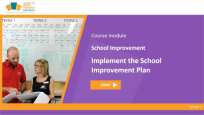

Implement the School Improvement Plan
Overview
In this module, participants will understand how to implement school improvement plans using evidence-based practices and technologies.
Learning Intents
- Develop a whole-school instructional learning and behaviour plan that includes reflective practices, structured feedback, and peer review (1.2.09).
- Develop a plan for improved outcomes based on student mastery and behaviour data (1.2.10).
- Implement school professional development plan using evidence-based practice and technologies (1.1.05).
- Evaluate effect of professional development on school improvement targets (1.1.05).
- Plan school improvement based on 8 Cycles of School Practice (1.1.06).
- Implement practices to enact, monitor and report school improvement strategies across the school and community (1.1.06).
- Review implementation of improvement plan with leaders and teaching team (1.1.06).
- Evaluate enactment, monitoring and reporting of improvement plan strategies (1.1.06).
- Implement practices that make up a results-focused instructional leader (1.1.07).
- Evaluate current practices around parent engagement and make improvement goals (1.1.08).
Monitor progress of the whole-school professional learning plan and effect of professional development on school improvement targets (1.1.09).
- Articulate and document the effects of professional development on student mastery goals (1.1.09).
- Manage coaching and feedback cycles to provide school team with regular feedback (1.1.10).
- Monitor student mastery and observation data and identify ways to improve teaching and learning (1.1.10).
- Implement practices built on a vision of success for every student (1.2.05).
- Review student data with teaching team and leadership to ensure leaders and school team adhere to the vision of high expectations with no excuses (1.2.05).
- Review student mastery data and set improvement actions to increase mastery (1.2.06).
- Plan regular cycles of peer instruction practice (1.2.07).
- Evaluate the effect of peer instruction practices on student mastery and effective teaching practices (1.2.07).
- Implement cycles of parent engagement to support parents in increasing student learning outcomes (1.2.08).
- Evaluate ways parents are being engaged in supporting learning and apply to practices (1.2.08).
- Understand cycles of school practice that increase community engagement (1.3.04).
- Plan regular communication with leaders and teaching faculty focused on research of effective teaching (1.3.05).
- Implement school improvement efforts based on research on effective teaching (1.3.05).
- Plan school professional conversations based around collaborative and creative practices focused on school improvement (1.3.07).
- Plan practices that increase parent engagement to meet the diverse educational needs of students (1.4.06).
- Implement strategies that acknowledge and respect the culturally and linguistically diversity of families (1.4.06).
- Plan human resource management based primarily on instructional needs (1.5.05).
- Review how the school is applying resources to support students (1.5.08).
Prerequisite
- Learn Effective Teaching Essentials
Duration
- 12 lessons
Assessment
- Test: Knowledge and skills taught in the lessons.
Certification
Participants are eligible for certification based on attendance and completion of assessment requirements for each module.
- Certificate of Attendance: Complete online training and knowledge and skills tests.
Coach Peers in School Improvement
Deliver Cycles of School Practice Coaching
Overview
Deliver Cycles of School Practice Coaching is a professional learning module for instruction coaches. Participants will understand how the 8 Cycles of School Practice supports effective teaching. They will learn how to lead the school team in their professional learning plans and how to conduct classroom coaching in support of these plans. Participants will also learn how to hold school and classroom data reviews to support school improvement efforts and the processes for facilitating conversations and collaborating with the teaching team. Embedding the cycles to strengthen parent and community engagement in student learning and school improvement efforts will also be a part of this module.
Learning Intents
- Apply cycles of practice that support effective teaching implementation.
- Communicate to leaders and teaching faculty what constitutes effective teaching and cycles of practice that support implementation efforts.
- Understand how to implement practices that promote a culture of professional learning.
- Communicate importance of professional learning through practices that recognise efforts of leaders and teaching faculty to improve.
- Understand effective practices for engaging the community.
- Evaluate mastery of effective teaching and behaviour techniques among teachers and teaching assistants and provide suggestions for improvement.
- Plan training and coaching as per the professional development plan.
- Implement coaching and feedback cycles of practice.
- Review observations with teachers and teaching assistants.
- Plan student groups based on placement testing.
- Review groups, resource setup and schedules throughout the year.
- Evaluate practices around student placement testing, grouping, resource setup and schedules and determine where improvements can be made.
- Plan regular professional conversations.
- Implement cycles of practice that increase professional collegiality including professional conversations.
- Review participation of school leaders and teaching faculty in professional conversations.
Evaluate participation data and encourage entire school team to participate in collegial activities.
- Plan opportunities to educate and influence parents on ways to increase learning opportunities of their children.
- Review parent participation in engagement opportunities.
- Evaluate ways to increase parent participation in engagement activities.
- Implement cycles of practice to support fidelity of implementation including classroom observations, demonstrations, modelling, coaching and feedback on effective teaching.
- Coach teaching faculty in identifying coaching and training needs.
- Evaluate need for practice based on observation data and communicate to teachers.
- Review observation and student mastery data to determine need for reflective practices, structured feedback and peer
- Review.
- Plan a schedule for program practice sessions.
- Implement an effective agenda for practice sessions.
- Plan cycles of practice to cultivate a collaborative and trusting relationship with community.
- Implement practices that cultivate trust between the school and the community.
Prerequisite
- Learn Effective Teaching Essentials
Duration
- 12 lessons
Assessment
- Test: Knowledge and skills taught in the lessons.
Certification
Participants are eligible for certification based on attendance and completion of assessment requirements for each module.
- Certificate of Completion: Complete online training and knowledge and skills tests.
Learn Cycles of School Practice
Overview
Learn Cycles of School Practice is a professional learning module for principals, instruction coaches, teachers and teaching assistants. Participants will learn about the structure of the 8 Cycles of School Practice and understand how the cycles support effective teaching. They will learn how to engage in school-wide professional learning and how to participate in coaching in support of each team member’s professional development. Participants will also learn how to use school and classroom data reviews to support school improvement efforts, along with the processes for creating a culture of collaboration in the school. Embedding the cycles to strengthen parent and community engagement in student learning and school improvement efforts will also be a part of this module.
Learning Intents
- Understand key practices leading to instructional improvement through effective teaching.
- Plan school improvement based on 8 Cycles of School Practice.
- Plan professional learning focused on a vision of high expectations for all school team.
- Plan regular cycles of peer instruction practice.
- Understand link between data analysis and enhanced student results in academics and behaviour.
- Understand cycles of school practice that increase community engagement.
- Plan school professional conversations based around collaborative and creative practices focused on school improvement.
- Understand ways to communicate effectively and transparently with parents and the community.
- Understand importance of structured peer collegiality practices (collaboration and professional conversations).
- Plan around cycles of school practice to accelerate school improvement efforts.
- Apply cycles of practice that support effective teaching implementation.
- Understand how to implement practices that promote a culture of professional learning.
- Understand effective practices for engaging the community.
- Implement coaching and feedback cycles of practice.
- Implement cycles of practice that increase professional collegiality including professional conversations.
- Plan opportunities to educate and influence parents on ways to increase learning opportunities of their children.
Evaluate ways to increase parent participation in engagement activities.
- Understand how to use placement test data to place students in their correct levels and programs.
- Implement cycles of practice to support fidelity of implementation including classroom observations, demonstrations, modelling, coaching and feedback on effective teaching.
- Coach teaching faculty in identifying coaching and training needs.
- Plan a schedule for program practice sessions.
Implement an effective agenda for practice sessions.
- Understand basic effective teaching techniques and practices in academics and behaviour.
- Plan professional learning goals with school leadership.
- Understand how to improve effective teaching by engaging in training and coaching.
- Understand how to use peer coaching and feedback from colleagues to improve effective teaching techniques.
- Plan to perform techniques and practices to enable observations and assessment of newly mastered learning being delivered to fidelity.
- Plan a classroom data wall to communicate student progress to students.
- Understand how to network with peers to enhance effective teaching and broaden communities.
- Apply family engagement practices in the community with parents to build relationship between parent and school.
- Understand vision of school and community partnership to drive school improvement.
- Understand how to have honest conversations with parents about a student’s needs, behaviour, and their progress.
- Understand the need for effective teaching training.
- Understand how the Mastery Teaching Pathway helps to identify and plan professional needs.
- Apply school values in supporting instructional improvement.
- Review principles to build family and community engagement.
- Apply effective teaching techniques to meet needs of diverse student population.
- Understand the types of student data that are collected to support student learning and behaviour.
- Understand how participation in professional networks supports effective teaching through network building.
- Review current practice and identify areas of strength and need.
- Understand best practices for involving parents in their children’s education.
- Review school practices for engaging parents.
Prerequisite
- Learn Effective Teaching Essentials
Duration
- 12 lessons
Assessment
- Test: Knowledge and skills taught in the lessons.
Certification
Participants are eligible for certification based on attendance and completion of assessment requirements for each module.
- Certificate of Completion: Complete online training and knowledge and skills tests.

